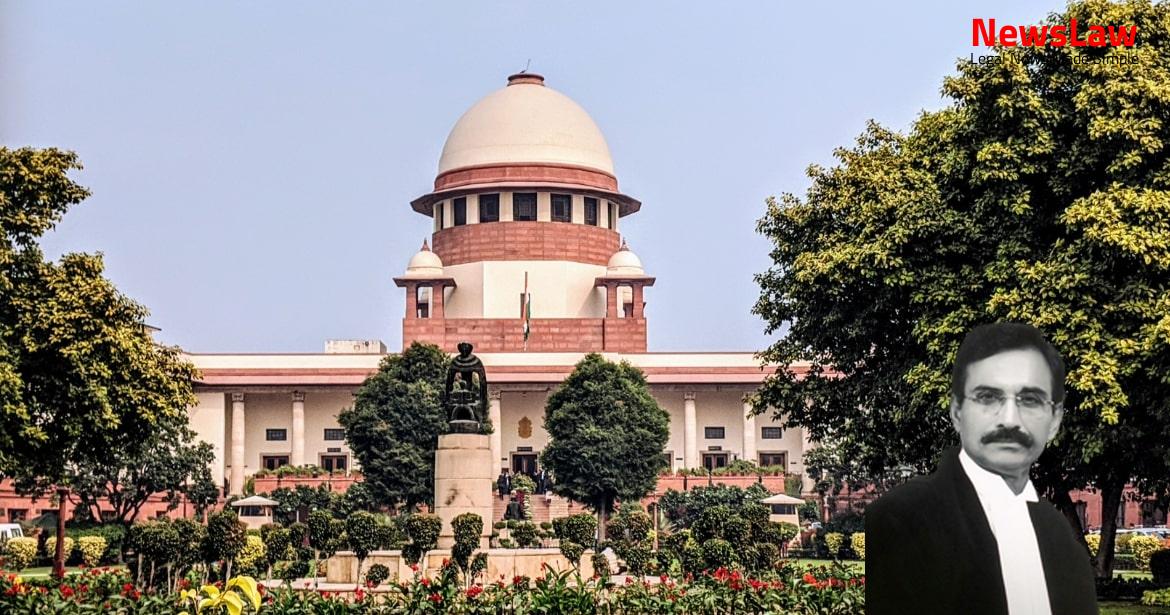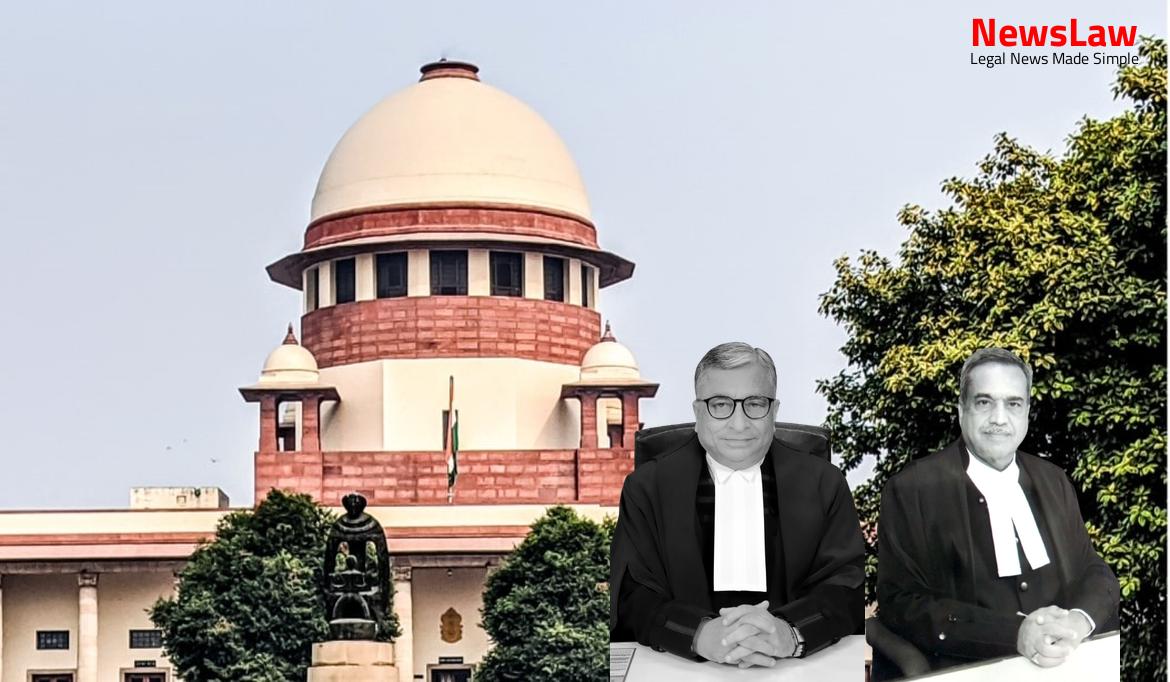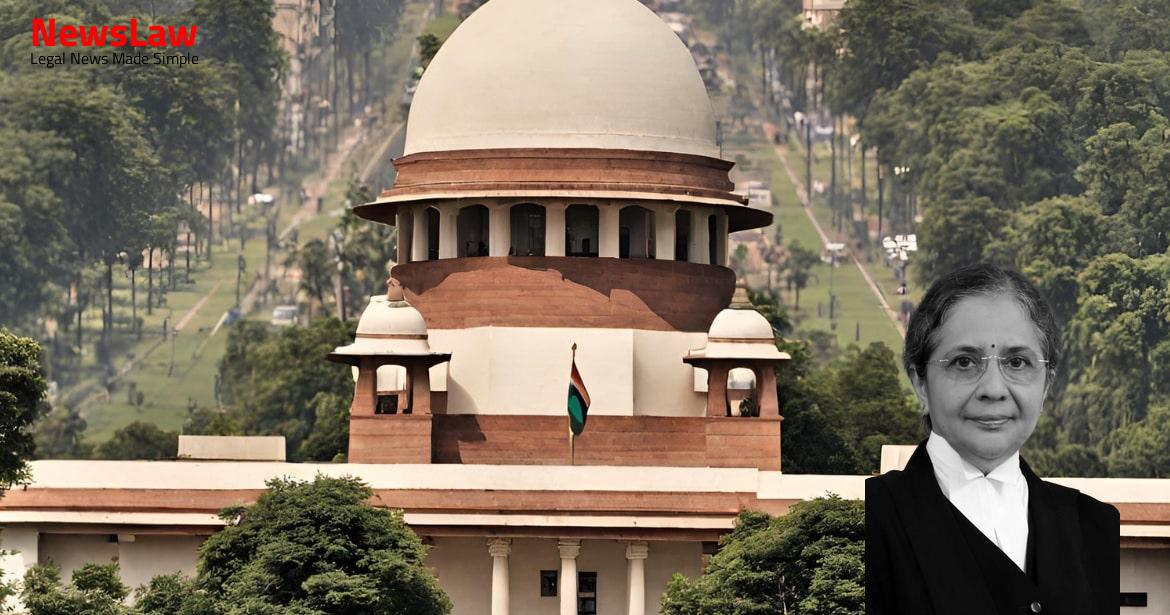The court’s in-depth legal analysis in a recent case delves into the interpretation of the term ‘sum’ under Section 31 of the Arbitration Act. This landmark ruling navigates the complexities of calculating interest in arbitration awards, emphasizing the importance of precision in legal interpretation. Stay tuned to unravel the nuances of the court’s decision and the implications it holds for future disputes.
Facts
- Controversy over whether the specified sum under clause (a) of sub-section (7) of Section 31 of the 1996 Act includes interest from cause of action to award date.
- Appellant-DAMEPL terminated Concession Agreement on 8 October, 2012.
- Delhi High Court passed certain interim orders during interlocutory proceedings.
- Respondent-DMRC referred dispute to Arbitration on 23 October, 2012, under Article 36.2 of Concession Agreement.
- Arbitral Award issued on 11 May, 2017.
- Impugned judgment rejected impleadment applications by Canara Bank and Union Bank of India.
- Respondent-DMRC liable to make Termination Payment as per Article 29 of Concession Agreement.
- Dispute between Appellant-DAMEPL and Respondent-DMRC during project operations.
- Appellant-DAMEPL paid stamp duty of Rs.4,72,20,000/- on the Award on 12 May, 2017.
- Respondent-DMRC filed Petition under Section 34 of the 1996 Act in Delhi High Court challenging Arbitral Award dated 11 May, 2017.
- The appellant-DAMEPL filed an Execution Petition before the Delhi High Court on 12 September, 2021, for enforcement of the Arbitral Award dated 11 May, 2017.
- Various orders were passed by the learned Single Judge of the Delhi High Court in the said proceedings.
- The judgment and order dated 6 March, 2018, upheld the Arbitral Award and rejected the respondent-DMRC’s petition under Section 34 of the 1996 Act.
- Directions were issued by the Single Judge with regard to the payment to be made by the respondent-DMRC towards the satisfaction of the Award.
- The respondent-DMRC challenged the judgment and order dated 6 March, 2018, before the Division Bench of the Delhi High Court by way of appeal.
Also Read: Presumption of Genuine Endorsements in Cheque Case
Issue
- The specific issue in this case is whether the ‘sum’ awarded under clause (a) of sub-section (7) of Section 31 of the Arbitration and Conciliation Act, 1996 includes interest pendente lite or not.
- The facts of the case involve a Concession Agreement dated 25 August, 2008 between the appellant DAMEPL and the respondent DMRC for a project.
- The Concession Agreement outlined the responsibilities of both parties, with civil works to be carried out by DMRC and other works by DAMEPL.
- The appeal revolves around the interpretation of the term ‘sum’ in relation to the award under the Concession Agreement.
Also Read: Medical Negligence and Compensation: A Landmark Decision
Arguments
- Learned Senior Counsel argues that the amount under clause (a) of sub-section (7) of Section 31 of the 1996 Act includes Termination Payment and interest granted by the Arbitral Tribunal.
- The appellant-DAMEPL contends that the sum specified in clause (a) of sub-section (7) of Section 31 of the 1996 Act is Rs.4662.59 crores, including interest awarded by the Arbitral Tribunal.
- The interpretation presented by the learned Senior Counsel is considered as the only logical one.
- The High Court erred in rejecting the claim of appellant-DAMEPL concerning the addition of interest pendente lite under clause (a) of sub-section (7) of Section 31 of the 1996 Act.
Also Read: Remand of Writ Petition for Restoration and Decision on Merits
Analysis
- The phrase ‘unless otherwise agreed by the parties’ in Section 31(7) of the 1996 Act emphasizes that parties can agree on aspects covered under the provision, removing the arbitrator’s discretion.
- The discretion to award interest or not is based on the agreement between the parties.
- Various sections of the 1996 Act contain the phrase ‘unless otherwise agreed by the parties’, indicating the importance of party agreements.
- Interpretation of statutes must consider the text and context, ensuring no word is rendered ineffective.
- Courts must interpret statutes by looking at the entire Act to fully understand legislative intent.
- Different judgments may be interpreted based on the specific facts and circumstances of each case.
- In the case of Hyder Consulting (UK) Limited, the court emphasized the importance of giving effect to every word and phrase in a provision.
- The court highlighted that the discretion for granting interest lies with the arbitrator only when there is no agreement between the parties.
- The majority judgment in Hyder Consulting (UK) Limited clarified that interest may be included in the sum awarded by the Arbitral Tribunal.
- Legislative words should be strictly interpreted without adding or subtracting, even if the outcome may seem unusual.
- The term ‘sum’ in the Act can refer to money or a collection of money.
- The court in various cases emphasized the importance of interpreting provisions to avoid rendering them purposeless or ineffective.
- Section 31(7) of the Act allows the Arbitral Tribunal to award interest on the sum directed to be paid by the arbitral award.
- The word ‘sum’ in this context refers to a particular amount of money, which may include both principal and interest.
- The purpose of including interest in the sum is to encourage early payment of the awarded amount and discourage delays.
- The provision grants the Arbitral Tribunal the power to include interest on the entire amount or part thereof for the pre-award period.
- If no interest is awarded, the sum comprises only the principal amount.
- The Tribunal has the discretion to include interest at a reasonable rate on the whole or any part of the money for the period between the cause of action and the award date.
- A sum directed to be paid by an arbitral award shall carry interest at a rate of eighteen percent per annum from the date of the award to the date of payment, unless otherwise directed by the award.
- When interpreting a statute, it is essential to consider the context of its enactment and understand the scheme, sections, clauses, phrases, and words in the context of the entire Act.
- Article 29.8 of the Concession Agreement specifies the procedure for Termination Payments and the possibility of interest if the full payment is not disbursed within 30 days.
- The Arbitral Tribunal has the discretion to award interest if not agreed otherwise by the parties.
- The Tribunal awarded interest at an annualized rate of SBI PLR + 2%, despite lower rates on loans taken by the appellant.
- Parliament’s intention in enacting the relevant sections of the 1996 Act is clear regarding the inclusion of interest in the ‘sum’ to be paid by the Tribunal.
- The Tribunal’s decision was in line with the Act and the agreement between the parties, including the provision for interest on the Termination Payment.
- Party autonomy is emphasized in the 1996 Act, giving parties the freedom to agree on various aspects, including interest rates.
- The phrase ‘unless otherwise agreed by the parties’ is pivotal in determining the Tribunal’s discretion in awarding interest.
- The Tribunal correctly interpreted the Concession Agreement and calculated the Termination Payment with interest based on the agreement.
- Provisions in the Act indicate that the Tribunal’s discretion on interest is limited if there is an agreement between the parties.
- The Tribunal’s decision to award interest at the specified rate in the Concession Agreement was upheld.
- The phrase ‘sum’ in the Act was deliberately chosen to include both the principal amount and interest, granting the Tribunal the power to determine interest.
- The Tribunal’s decision aligns with the statutory provisions and the specific agreement between the parties regarding interest rates on payments.
- The concept of interest and the Tribunal’s authority to award it are elaborated upon, emphasizing the importance of party agreements in determining interest rates.
- In cases where there is no agreement on interest, the Tribunal has the discretion to decide on the rate and period for which interest is applicable.
- The interest prior to the date of award and after the date of award will be governed by Article 29.8 of the Concession Agreement.
- This decision is based on the specific agreement between the parties.
Decision
- The findings recorded by the Arbitral Tribunal have reached finality as per the judgment and order dated 9 September, 2021.
- The observations of the learned Single Judge of the Delhi High Court in paragraph 30 of the impugned judgment dated 10 March, 2022, in Execution Petition OMP (ENF.) (COMM) No 145 of 2021 are upheld.
- Pending applications, if any, are disposed of.
- The present appeal is found to have no merit and is dismissed.
- There is no order as to costs.
Case Title: DELHI AIRPORT METRO EXPRESS PRIVATE LIMITED Vs. DELHI METRO RAIL CORPORATION (2022 INSC 522)
Case Number: C.A. No.-003657-003657 / 2022



